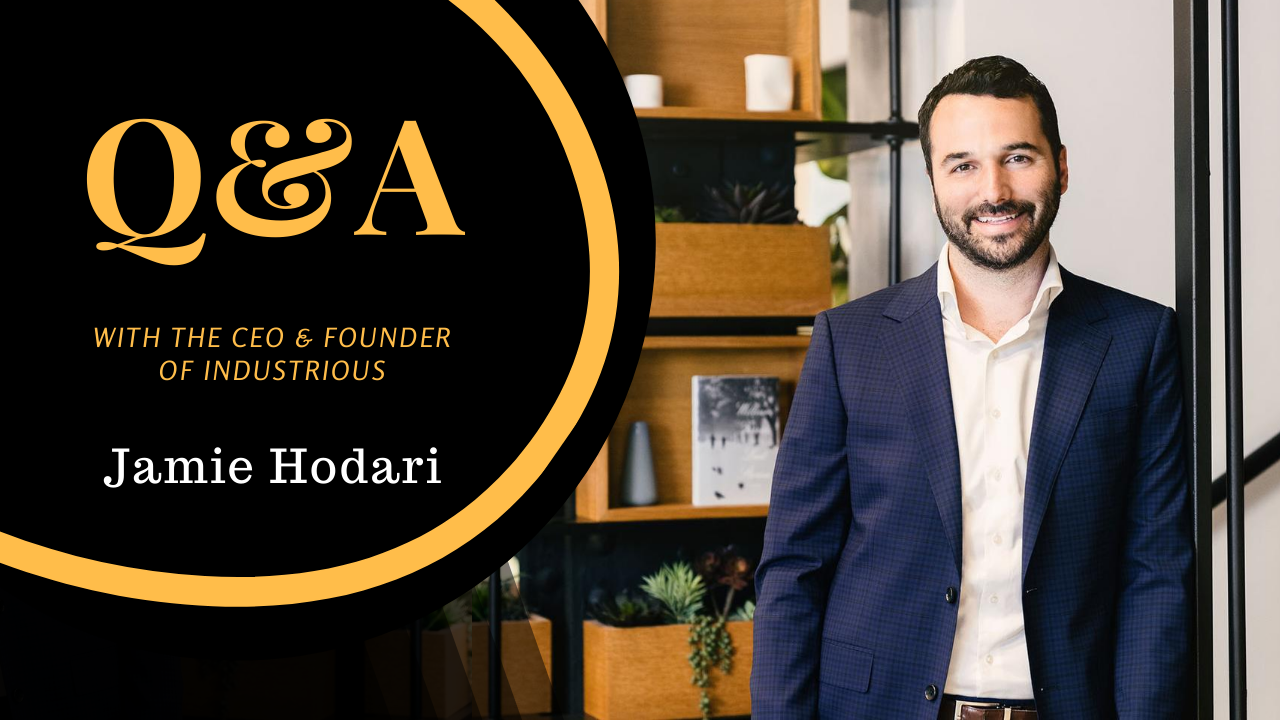- In this Q&A with Allwork.Space, Jeff Reinstein, Chief Executive of Premier Workspaces, discusses the company’s future growth strategy.
- Reinstein explains why he believes Premier is “uniquely positioned” to grow, particularly during the current crisis, and why adding 100 locations is a realistic goal.
- Elaborating on their successful operating strategy, Reinstein shares three golden rules to help other workspace operators emerge from the pandemic.
Premier Workspaces recently announced that they plan to add more than 100 flexible workspace locations to their portfolio over the next few years. The company will rely on backing from its multi-billion dollar real estate holding company investor, The Bascom Group, LLC, to fund the growth.
Allwork.Space spoke with Premier Workspaces’ Chief Executive, Jeff Reinstein to learn more about why the company is uniquely positioned to grow at the moment, despite the current environment that has caused a lot of distress to the flexible workspace industry.
Allwork.Space: Tell us a bit about your experience in the flexible workspace industry.
Jeff Reinstein: I worked for 13 years of my career on the landlord side of the business and have run two different shared workspace companies. I believe this gives me a unique perspective, since I know what is important for a landlord and what is important for a shared workspace business to succeed.
I started Premier Workspaces 19 years ago. The company started out by acquiring a distressed flexible workspace operator with 9 locations that was in bankruptcy. Over the course of 19 years, we have owned and operated 132 flexible workspace centers.
One thing that makes Premier Workspaces different than other operators in our industry is that we have been through a recession, and we came out successful. During the last recession we were able not only to maintain our profitability, but also double the size of the company without taking on any debt.
Our current growth plans aim for us to accomplish what we achieved over a decade ago.
Allwork.Space: Premier Workspaces did pretty well last time there was an economic crisis. Can you say the same about the current one?
Just like all of our competitors, we were negatively impacted by the pandemic. However, based on what I have read we have been able to maintain a much higher level of occupancy and revenues.
Allwork.Space: Why do you believe you maintained higher occupancy levels?
Premier Workspaces has always focused on individual private offices, and I believe this gave us a competitive edge during the pandemic as people were naturally wanting to socially distance. This allowed us to keep our doors open while competitors had to close or reconfigure their open or shared coworking space areas.
Our focus on private offices aside, we also benefited from our economies of scale, relationships with building owners, and brand loyalty – people who decided to stick around during uncertainty. Part of the reason we were able to retain our members was because we implemented a robust on-site plan with additional safety measures and sanitation processes.
Allwork.Space: Your experience with a recession and having fared fairly well during the pandemic has led Premier to make the decision to expand by 100 locations over the next few years. Why do you think now is the right time to expand?
Thousands of shared workspace locations have been added over the past 10 years by inexperienced operators and many of them are in distress; this is when our company thrives.
Throughout our history, we have taken over 76 distressed shared workspace locations and repositioned them, so for us, this is a great time to grow. I am not aware of any other operators that have the same experience as Premier in terms of repositioning distressed shared workspace locations.
Because of this, adding 100 locations seems to be a realistic goal for us.
Other than our experience in down markets, there’s also the fact that remote workers and corporations are transitioning to a hybrid model that increasingly involves flexible space, which should bring more customers into the fold for us.
We know this as we’ve recently been flooded with requests from landlords, brokers, and corporations who want to integrate a flexible workspace model into their real estate strategy.
Allwork.Space: Where are you planning on adding locations?
We’re entertaining all options.
Currently, there’s an increased demand in suburban markets, so that’s an area of focus; however we’ll continue to build our presence in urban markets as well.
Allwork.Space: What makes your business model unique?
Our model is based on 19 years of profitable growth. While we naturally focus on increasing revenue, we also focus on keeping expenses down and prioritizing ROI and cash flow. This is unlike many of the newer companies in our industry that have exclusively focused on growing revenue at any cost and spend way more money than necessary on their space, which puts them into debt or requires them to raise large sums of equity.
Our focus is on return on investment and generating sustainable cash flow. Our goal is to generate as much cash flow as possible during the initial term of the lease. If we are able to renew the lease and continue to be profitable that is great too.
Allwork.Space: Given your track record and Premier’s success in times of crisis, what are some tips you can share with other flexible workspace operators as we come out of the pandemic?
- Make well-researched, informed decisions based on solid financial data. Don’t expand for the sake of expanding. Only do it if it makes sense.
- Focus on return on investment when designing and fitting out the space so you don’t over spend. Don’t spend money on things that won’t help you generate more revenue or bring more customers to the space.
- Have a clear plan and work with people who can help you fulfill it.



 Dr. Gleb Tsipursky – The Office Whisperer
Dr. Gleb Tsipursky – The Office Whisperer Nirit Cohen – WorkFutures
Nirit Cohen – WorkFutures Angela Howard – Culture Expert
Angela Howard – Culture Expert Drew Jones – Design & Innovation
Drew Jones – Design & Innovation Jonathan Price – CRE & Flex Expert
Jonathan Price – CRE & Flex Expert














